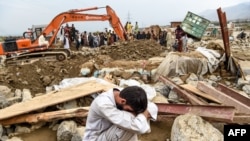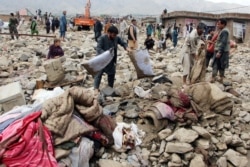Flash floods killed more than 70 people and injured close to 100 in Parwan province, north of Kabul, Afghanistan, early Wednesday and the numbers may rise as more cases are reported, said officials monitoring the situation.
In the provincial capital, Charikar, hundreds of homes have been destroyed and the search is on for people buried under rubble, said Ahmad Tameem Azimi, a spokesman for the Ministry of Disaster Management.
Many of the injured were rushed to Parwan provincial hospital and some were in critical condition, according to Dr. Abdul Khalil Haidari, the head of the facility.
President Ashraf Ghani said he was “deeply affected by the loss of life and financial losses” caused by the floods in a tweet from his office and ordered emergency supplies to be delivered to the affected areas.
The United Nations Assistance Mission in Afghanistan said it, along with its partners, mobilized support for provincial authorities and was “ready to assist in all efforts to alleviate human suffering.”
Official figures show natural disasters in the last five months have killed more than 300 people and effected more than 20,000 families in one way or another. Hundreds of families have been displaced.
The disaster comes amid efforts to end the U.S.-led war in Afghanistan, which has spanned nearly two decades.
Peace talks between Taliban militants and the Afghan government have been delayed over the issue of prisoner releases.
The Taliban were supposed to release 1,000 Afghan security personnel in return for 5,000 of their own as part of an agreement that the United States and Taliban signed in February. Most of the prisoners have been released by both sides, but there is disagreement over 320 Taliban.
The Afghan government wants around 20 of its commandos set free before the final Taliban militants are let go. In addition, Australia and France object to the release of militants who have killed Australian or French citizens.
This year, almost 116,000 people have left their homes due to fighting and many remain displaced as conflict and poverty prevent them from returning to their areas of origin,” according to OCHA, the United Nations office that coordinates humanitarian responses.
The U.N. said in a July statement that more than 800 people were killed and injured in deliberate attacks in the first six months of the year, attributing responsibility for half of the civilian casualties to the Taliban.






